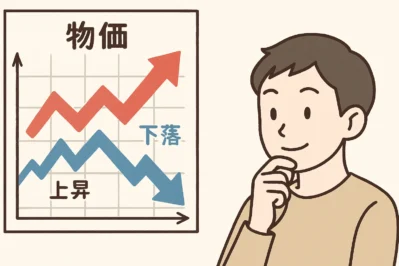Up or Down? Master Korean Economic Buzzwords!
Hello! This is [Maeil Hangul], here to upgrade your Korean skills!
Have you ever seen a Korean news report or a YouTube video with lots of graphs and charts and felt a little lost? Don’t worry, you’re not alone! Today, we’re going to learn some essential Korean words that will help you understand economic trends like a pro.
These days in Korea, everyone is talking about the economy, from the stock market (주식) to the rising cost of living (물가). Understanding these key terms will not only help you read the news but also join in on everyday conversations with your Korean friends. Let’s get started!
Core Expressions You Need to Know
Here are the key words you’ll see on every chart and in every news headline.
1. 상승 (sang-seung) / 하락 (ha-rak)
* Romanization: [sang-seung] / [ha-rak]
* English Meaning: Rise / Fall (or Increase / Decrease)
* Detailed Explanation: These are nouns derived from Chinese characters and are very common in formal writing, news, and presentations. You’ll often see them with an upward arrow (↑) for 상승 and a downward arrow (↓) for 하락. They are the most basic and important words for describing trends.
2. 증가하다 (jeung-ga-ha-da) / 감소하다 (gam-so-ha-da)
* Romanization: [jeung-ga-ha-da] / [gam-so-ha-da]
* English Meaning: To increase / To decrease
* Detailed Explanation: These are the verb forms of “increase” and “decrease.” While 상승/하락 are often used as nouns (e.g., “a price rise”), 증가하다/감소하다 are used as action words in sentences. For example, “Prices increased” (물가가 증가했어요). They are slightly more formal than the native Korean verbs 오르다 (to go up) and 내리다 (to go down), but you’ll see them constantly in any data-related context.
3. 물가 (mul-ga)
* Romanization: [mul-ga]
* English Meaning: Prices (of goods) / Cost of living
* Detailed Explanation: This word literally means “price of things.” It’s used to talk about the general price level in a country, or the cost of living. When you hear Koreans worrying that “물가 is too high,” they’re talking about inflation and how expensive everything has become. It’s a super common topic of conversation!
4. 전년 대비 (jeon-nyeon dae-bi)
* Romanization: [jeon-nyeon dae-bi]
* English Meaning: Compared to the previous year / Year-on-year
* Detailed Explanation: This is a key phrase for reading infographics! 전년 (jeon-nyeon) means “previous year,” and 대비 (dae-bi) means “in comparison with.” So, when you see a headline like “수출, 전년 대비 10% 증가,” it means “Exports increased by 10% compared to the previous year.” Mastering this phrase will make you sound very knowledgeable!
Example Conversation
Let’s see how these words are used in a real conversation. Two friends, A and B, are looking at a news article on their phones.
A: 와, 이 뉴스 좀 봐. 요즘 아이스크림 물가가 장난 아니네.
Wa, i nyu-seu jom bwa. Yo-jeum a-i-seu-keu-rim mul-ga-ga jang-nan a-ni-ne.
(Wow, look at this news. The price of ice cream is no joke these days.)
B: 어디 보자… “아이스크림 가격, 전년 대비 15% 상승“? 진짜 많이 올랐다!
Eo-di bo-ja… “A-i-seu-keu-rim ga-gyeok, jeon-nyeon dae-bi si-bo-peo-sen-teu sang-seung“? Jin-jja ma-ni ol-lat-da!
(Let me see… “Ice cream prices, a 15% rise compared to last year“? They’ve really gone up a lot!)
A: 맞아. 내 월급은 그대로인데, 지출만 증가하고 있어.
Ma-ja. Nae wol-geub-eun geu-dae-ro-in-de, ji-chul-man jeung-ga-ha-go i-sseo.
(Exactly. My salary is the same, but only my spending is increasing.)
B: 내 말이! 빨리 내 주식 가격의 하락이 멈춰야 할 텐데…
Nae mal-i! Ppal-li nae ju-sik ga-gyeog-ui ha-rak-i meom-chwo-ya hal ten-de…
(I know, right! I hope the fall of my stock prices stops soon…)
Culture Tip & Trend Deep Dive
In Korea, especially among the MZ Generation (Millennials + Gen Z), talking about personal finance and investments, known as 재테크 (jae-te-keu), is incredibly common. It’s a combination of the words 재물 (jaemul – wealth) and 테크놀로지 (tekeu-nol-lo-ji – technology).
You will often see young Koreans checking stock market apps on the subway or discussing their investments with friends at a café. So, when you see a chart showing the 상승 of a company’s stock or the 하락 of interest rates, you’re not just reading data; you’re looking at a major topic of daily conversation in modern Korea. Using words like 전년 대비 in a sentence will definitely make your Korean friends think your language skills are impressive!
Let’s Review and Practice!
Great job today! We learned some key vocabulary for understanding economic trends: 상승 (rise), 하락 (fall), 증가하다 (to increase), 감소하다 (to decrease), 물가 (prices), and 전년 대비 (compared to last year).
Now, let’s test your knowledge!
Practice Question: Fill in the blank with the correct word from today’s lesson.
- If coffee prices went up 5% compared to last year, you would say: “커피 가격이 ______ 5% 상승했어요.” (keo-pi ga-gyeog-i ______ o-peo-sen-teu sang-seung-haess-eo-yo.)
What do you think the answer is? Try to make your own sentence using one of the words we learned today and leave it in the comments below! We’d love to see what you come up with.






